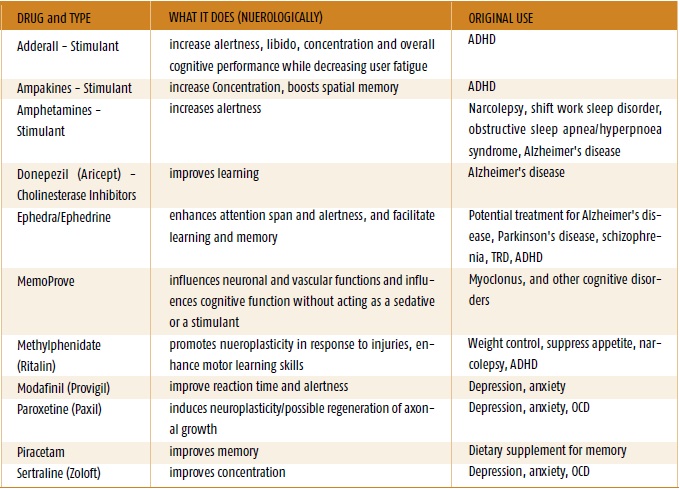➣ Chelsea Barclay
For various reasons cognitive enhancement drugs have widely been in use by various individuals for over fifty years. Their ability to help those with social anxieties learn more from therapy means that virtual reality (VR) therapy has the potential to benefit from these drugs by increasing the positive results patients receive when coupling the drugs with the therapy. VR usage of the drugs is aimed at making learning in therapeutic cognitive-behavioral therapy stronger.
Different drugs harbor different functions ranging from increased alertness and concentration, to improving memory and learning. Cognitive enhancement drugs have been, and are prescribed for, various reasons such as ADHD, narcolepsy, depression, anxiety, etc. The potential benefit VR therapy can gain from cognitive enhancement drugs is extremely significant. Many studies directly related to the effects of cognitive enhancement drugs in individuals continue to be carried out, studied, and published.
For example, VR therapy aimed at enhancing motor skills needed in learning to drive could benefit from the use of Amphetamines, originally prescribed for narcolepsy and obstructive sleep apnea. Amphetamines seemingly promote the ability of the brain to create and/or strengthen connec t ions b e twe en n e u ro n s (neuroplasticity). These connections are the underlying cause of simple and complex movement, and can therefore improve the effects of the VR therapy.
The use of cognitive enhancement drugs is multiplying rapidly among people of all ages and locations, and as a result their uses, benefits, and side effects are being made known in the public and scientific communities. The degree to which VR therapy could avail with the use of cognitive enhancement drugs is an exciting discovery.
RESEARCHER:
Chelsea Barclay
Editorial
Department
C&R Magazine
www.vrphobia.eu
cbarclay@vrphobia.com
About Brenda Wiederhold
President of Virtual Reality Medical Institute (VRMI) in Brussels, Belgium.
Executive VP Virtual Reality Medical Center (VRMC), based in San Diego and Los Angeles, California.
CEO of Interactive Media Institute a 501c3 non-profit
Clinical Instructor in Department of Psychiatry at UCSD
Founder of CyberPsychology, CyberTherapy, & Social Networking Conference
Visiting Professor at Catholic University Milan.










